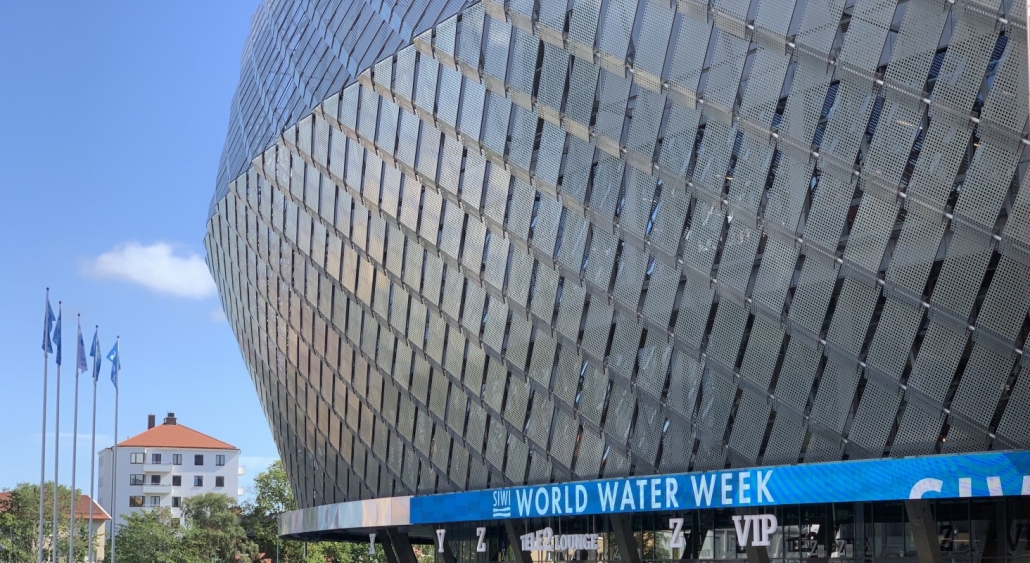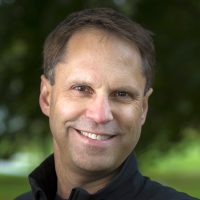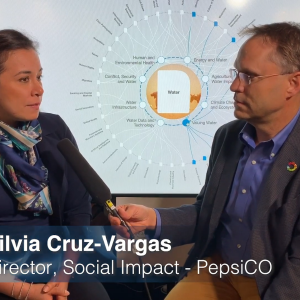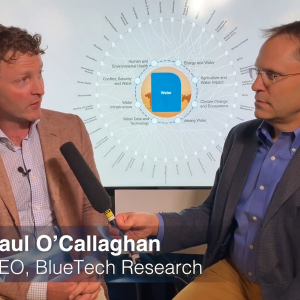
World Water Week interview with Lara Fowler, Senior lecturer at Penn State Law.
Speakers
Lara Fowler
Lara Fowler is a Senior lecturer (Penn State Law) and Assistant Director for Outreach & Engagement (Penn State Institutes of Energy & the Environment).
J. Carl Ganter
J. Carl Ganter is co-founder and director of Circle of Blue, the center for frontline reporting, research, and analysis on water resource issues and their relationship to food and energy in a changing climate.
Lara Fowler discusses breaking silos, establishing processes, success stories, and more.
Transcript
J. Carl Ganter: I’m here with Lara Fowler from Penn State University. Lara, tell me your position. You were talking a little bit about also water mediation, water negotiation. I want to hear more about that. Tell me what you do.
Lara Fowler: Sure. I currently work at Penn State University. I have a dual position. I’m half at the law school, so I teach law students. Then I’m also the assistant director of a university-wide set of institutes that deals with energy and environment. I’m currently in Sweden. Just started a Fulbright Scholar Program for the year. I’ve done a lot of work on water and water conflict, but also a lot of work as a mediator, an environmental mediator working on water issues. How do people come together to deal with questions of science, law, policy and the age old question of how do we actually get something done?
I’ve had the privilege of working with a number of different groups primarily on the Western coast of the United States, Oregon, Washington, and California on difficult intractable situations where people are trying to accomplish just that.
J. Carl Ganter: Intractable situations. It seems like over the years, water has been chugging along as far as moving up on the agenda, making the top five in the World Economic Forums, Global Risks Report, these other issues. Are you seeing that people are coming together to solve some of these big challenges?
Lara Fowler: Yes. I think that’s one of the challenges that we were talking about, is how do you share those success stories? When I say intractable questions, questions like who gets to destroy and use groundwater in the greater Los Angeles Area? A lot of people, a lot of issues. But who do you even bring to the table to have a conversation about that? Or how do you fix flooding in a river basin in Washington State where they have a hundred year history of pretty bad flooding, much, much worse over the last couple of decades?
Part of it is driven sometimes as people have talked about at this conference by catastrophe. Something bad happens. Then people realize they actually need to deal with it. Sometimes it’s driven by local leaders who say, “Wait a second. There’s a different way to do this. How do we actually come together to start to find solutions?” In a lot of the places where I’ve had the privilege to work with people, there’s a bottom-up pressure and a top-down set of support saying, “Yeah, work together to actually find those solutions. Here’s money, for example, to help bring people together to facilitate those kinds of conversations.” But it takes that kind of joint effort. It takes a willingness to say, “Wait a second. We think there’s a way through this, but we don’t know how to do it and we’re going to work on this together.”
J. Carl Ganter: There was a session yesterday. The Water Resources Group had some interesting outcomes, some usual outcomes. Really talking about getting ahead of these crises and starting to bring people together. What are some of the big challenges, some of the big impediments to, in a sense, collective action?
Lara Fowler: I think one impediment actually is we’re collectively willing to spend a lot of money on projects. I think there’s also a need for funding for process. It’s not, “Hey, here’s one year and this is going to be done very quickly.” But it’s, “What’s a dedicated funding source for several years or even decades to help bring people together?” Oregon, for example, in the late 1990s was trying to forestall listing of a number of iconic salmon species under the Endangered Species Act. The governor at the time, John Kitzhaber, basically said, “We could work in siloed ways, agency by agency, but we’re not getting there. What if we all come together?”
He created a new state agency called the Oregon Watershed Enhancement Board that has now for 22 years been funding local watershed restoration work. If you look at what has come out of that bottom-up approach to we know our watershed best, dedicated funding that has helped support the process side to deal with some of the substantive questions that are coming up. I teach mediation, dispute resolution. I think a lot about substantive questions people want to get to, but they often forget that they need to deal with the people, questions of trust, who’s involved, and the process, how do you get there?
I spend a lot more time on those bottom two so that people can talk about the substantive issues that they want to be talking about and want to solve. But if you can’t trust the person who walked into the room or the process is set up poorly, you’re not going to be able to get to that substance.
J. Carl Ganter: Right. There have been a lot of sessions where we spend a lot of time at whiteboards and boil all down to, and it does come down to the big word trust.
Lara Fowler: Sure.
J. Carl Ganter: When you’re talking about process, and you’re talking about funding for processes, one, you have to train people to manage those processes. But like you said, you have to fund them. Is the funding community stepping up to that? Or are they still focused on some of the metrics of either how many X number of whatever widgets or wells were provided?
Lara Fowler: I think it’s easier to count widgets or wells. It’s harder to count process. For example, one of the river basins I worked in in Washington State, I was the third out of fourth facilitator there. They really started a dedicated facilitation process in 2007, 2008 following a catastrophic flood in 2007. I don’t know that anybody anticipated it would take 12 years, but they went from very difficult and challenging situation and a lot of finger pointing and blame to winning an award at the national level earlier this summer from the Association of Floodplain Managers because of their ability to come together.
Some of what I’m talking about in terms of success isn’t radical. It’s crazy notions that people can do anywhere in the world of getting out of your normal meeting places and going out and seeing the resource in question. Going on tours in the Chehalis Basin, which is the river basin I’m talking about in Washington State. There’s a friendly competition about who could serve the best food for the meetings. It went from, “This is what I need for my community,” to, “Wait a second. We’re all in this together and this is what you need for your community.”
That took time. I think people underestimate the time and the money it takes to bridge that amount of process to get there. Yet, we’re spending a lot of money and we’re spending it ineffectively a lot of times. I’m also seeing another challenge, but also an opportunity and a challenge of budgets being there’s nothing, nothing, nothing, spent $50 million in a month. Much like we’re seeing precipitation come with drought, drought, drought, flood, we need to be rethinking both sets of systems. The funding cycle as well as the biophysical cycle. How do we even those out to provide a little bit more stable funding source and ecological source of water so that we’re not in that drought flood cycle?
J. Carl Ganter: Oh, interesting metaphors. If there was one project that you wanted to mediate globally, or in the US, is there one that you would really like to take on or maybe that you can talk about that you’re in the middle of or that you achieved? I mean, what’s on your radar.
Lara Fowler: Sure. I mean, one of the projects I’m currently working with quite a bit is with the Chesapeake Bay. I’m in Pennsylvania. I’m at Penn State. I have a lot of colleagues who are working with various aspects of research with that. What’s intrigued me about moving to a place like Pennsylvania seven years ago from Washington State is it’s quite a bit more rural than I expected, but it’s also a really important part of the Chesapeake Bay watershed. The discussion for a lot of years is, how do we fix the Bay? It’s shifted to, how do we fix the watershed so that we can affect the water quality in the Bay?
What I’m really curious about, and we’ve been really working to figure out how to do is, how do you ensure a healthy and productive and reliable farming at a time of climate change? How do we produce good soil health, for example, for healthy food for people, productive agriculture for the farmers, and the benefit that comes from water quality? How do you stack all of those things together? I’ve been working with a whole bunch of people to help pull the pieces of having that kind of discussion within the state, looking for those win-win solutions.
Can Pennsylvania be a way to leap frog some of the real serious water quality questions we see playing out all over the world? Perhaps. Are there ways to do innovative financing and funding, for example, within a place like Pennsylvania where people think, “Oh, money’s not an issue,” where we have pretty serious budgetary questions? But what’s it take to bring the funders to the table with a water quality, the ecosystem services, the folks in the flooding world who are saying, “Well, how do we fix this?” People on the ecosystem service side, people on the water quality side, and bring them all into the same place so that you’re solving multiple questions at the same time.
J. Carl Ganter: Right. If we’re back here next year or somewhere else and we’re talking about the processes, are we ready to embrace? We meaning, I’m saying, the water sector, the funding sector, the process, the change that’s necessary at pace.
Lara Fowler: That’s a great question. I mean, I do think in places where I’ve had the privilege to work, people are really hungry for a different way forward. They’re hungry for what works. They’re tired of the doom and gloom. They’re tired of being told they can’t do it. But for example, in the Chehalis Basin, well, the narrative was, “We can’t do this.” They couldn’t do it. As it started to shift to say, “Well, wait a second. We actually can find the solutions to this,” in every process I’ve been part of. It’s been a number of processes. A food fight between Northern and Southern California over water allocation for example as they created their own opportunities and solving it. When I’ve talked with people who are a part of those processes later, they’ve said, “That allowed us a more creative and lasting set of solutions than we could have done in court or by ourselves.”
That’s where, I think, part of my wish is to share those success stories. Where has this worked? It’s working in lots of places around the world. Why? How do we learn from each other better and faster? Even if the processes take time themselves to do, sometimes you do have to go a little slower to go faster. But if we’re spending the amount of money that we are on projects, can we do so in a way that ensures that we have the process to go with those projects?
J. Carl Ganter: Great. Well, thank you, Lara Fowler at World Water Week. I’m J. Carl Ganter for Circle of Blue.






